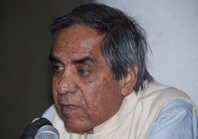In My View:
Vitality of Indian Music

In My View:Vitality of Indian Music
|

|
By Pandit Omprakash Chourasiya |
| Pandit Omparaksh Chouraisya is a santoor artiste, music composer and visionary responsible for many new practices in creation, organization, promostion and appreciation of Indian Classical Music. He served as Director, Ustad Alauddin Khan Sangeet Akademi, Bhopal nurturing it since inception and is Director of Madhukali, an organization dedicated to memory of Sangeetendu Pt. Lalmani Misra. |  |
Although the scenario appears bleak to purists, in an age where ICTs have brought people closer and demolished boundaries, it is a great relief that our youth is still interested in classical music. Even though he is motivated by ambition and is unlike the dedicated, devoted Shishya of the olden days, the very fact that he is learning Indian Classical music ensures longevity of our heritage. And not only Indians, but students from across the globe are learning Indian Classical Music. Music is no longer lost but preserved through recordings. There are several prestigious bodies which are engaged in archival work. Today when a healthy demand has built up for classical music, they are gradually opening up their treasure trove. Sangeet Natak Akademi has brought out compact discs of Pandit Krishna Rao Pandit, Pt. Narayan Rao Vyas, Vidushi Kesarbai Kerkar, Ustad Bade Ghulam Ali Khan, Ustad Amir Khan, Ustad Ilyas Khan, Pt. Radhika Mohan Moitra among others. Akashvani, too, has brought out cassettes and CDs of great masters. One has easy access now to exclusive recordings of Pandit Omkarnath Thakur, Pt. Dattatreya Vishnu Paluskar, Pannalala Ghosh, Semmangudi Srinivas Iyer, Ustad Allauddin Khan, Pt. Bhimsen Joshi, Pt. Kumar Gandharva, Siddheshwari Devi etc. If you add titles published by commercial music companies, there is a huge body of Indian music available to a learner or an enthusiast at his doorsteps. It is far easy to learn Indian music today than it was a century ago.
It may come as a surprise, but the only Indian magazine that has been continually published for over 75 years now is devoted to music -- Sangeet from Sangeet Karyalaya, Hathras. Several publishing houses have started a music division. More books have been written and published in past decade than in first ninety years of twentieth century. A google search for “Indian Classical Music” yields 432,000 results. Indian teachers are giving music lessons through internet. The first distance education body in Madhya Pradesh, Bhoj University has finalized syllabus for degree level course in Indian music. The national body for open education, IGNOU too has started a cell for catering to students in this discipline and would soon announce its courses. Students from across the world come to study music in Indian universities and in turn contribute to practice of Indian music in their own way. Western students sing Dhrupad and try to play ICM on their favourite instruments; the most recent adaptation is of Cello. The instrument has been fitted with flat bridge and sympathetic strings for playing Indian music. Nancy Lesh and Saskia Rao de Haas give regular concerts. Others like James Barralet use the original Cello to play Indian music. There is no end to innovation at the Indian end. Raza Kazim, founder of Sanjannagar institute of Philosophy and Arts has created Sagar Veena; while Indore based Guitar and Vichitra Veena performer Niranjan Haldar has designed Ranja Veena. There are many variants of Violin, from Ramolin to Bela-bahar. But the sole invention in twentieth century which has revolutionized practice of Indian music is G. Rajnarayan’s invention, electronic Tanpura and Tabla. This has liberated the Indian artiste, specially those in their formative years. Having done away with dependence on human accompaniment, these instruments also accord privacy and flexibility to the artiste.
Whichever way I look I find that Indian Classical Music is far more approachable today than fifty or even thirty years back. From my Guru Sangeetendu Dr. Lalmani Misra I had learnt that our duty is to act with best intentions; reward shall take care of itself. I have full faith in aesthetic principles which govern ICM and in our youth, that the stream of this music shall ever remain bubbling and pulsating.

Links:
In My View: Pt. Rajshekhar Mansur
In My View: Dr. Chandrakant Sardeshmukh
In My View: Dr. Sanjoy Bandopadhyaya
In My View: Vidushi Uma Dogra
In My View: Shri Anoop Jalota